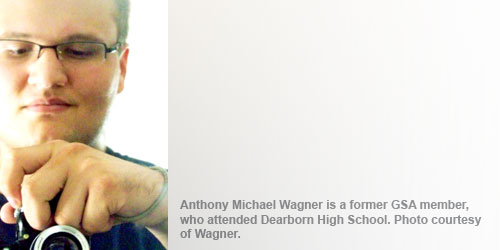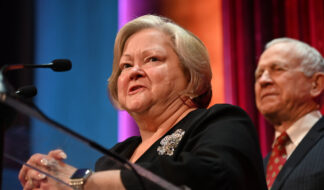
Do GSAs help the young people who participate in them? To many in the LGBT community, the benefits seem obvious, yet until now there was not much data to back it up. A new study leans in the direction of understanding by examining the experiences of 245 young LGBT adults who identified as gay in high school and came out to at least one parent. Approximately one-third of the participants had access to a GSA at that time they came out. The study was published in Applied Developmental Science and conducted by Russell B. Toomey.
GSAs, or Gay Straight Alliances, as defined in this study, are student-led, school-based clubs that aim to provide a safe environment in the school context for lesbian, gay, bisexual and transgender students as well as their straight allies.
The study had several limitations, including small sample size and lack of comparison to schools without such programs. However, the results do show that former GSA members found the organization to be helpful. It also concluded, "the presence of a GSA was associated with less high school dropout risk and greater college education and attainment.
The authors also pointed out "the presence of GSAs in schools is a matter of contemporary public debate even though the 1984 Federal Equal Access Act mandates that schools receiving federal funding cannot discriminate against student groups." Some schools have prohibited GSAs from forming, while others have embraced them.
Like the young adults in Toomey's study, Anthony Michael Wagner is a former GSA member, who attended Dearborn High School. Not only was Wagner a member, he was also the group's founder and president for two years.
"I started the group in the winter of 2005 when I was a sophomore," Wagner said. "I'd come out earlier the previous year, and started finding resources online about GSAs. I'm not sure what finally convinced me to do so, but I decided to give it a shot – despite pressure from my mother. Before checking with any administrators, I circled a petition at Dearborn High asking for signatures of support for the group. I got around 100-150, and was turned down only once.
"After completing my petition, and gathering a sizable amount of resources online, I started inquiring about starting a group. I was amazed at how easily everything happened; I met no resistance whatsoever. Then principal Gail Shenkman was fully behind us, and made it comfortable to begin," Wagner said. "When I was in the group, the number of members that attended meetings on a regular basis varied from 10 to 20 people. I just went back a month or so ago, just to see how things were going. I was amazed to find that they have 30+ regularly attending members."
Wagner is now a member of the GSA at The University of Michigan Dearborn. The support he's received, and the leadership skills he's gained, have helped him to remain an active, involved activist for his community. "I learned that I had the strength to lead a group of people. I learned that I had the courage to stand up for LGBTQ rights. And I learned that there were plenty of people around who supported me and my ideas. I also took a fantastic wealth of knowledge regarding leadership from this group. I know that without the GSA at Dearborn High, I'd be a very different individual now."
He suggests other students get involved and start GSAs in their own schools. "Knowing that there's a place to go each week where what you say regarding gender and sexuality won't get you beaten up is extraordinarily comforting to young students still learning about who they are. So many kids are bullied and harassed for just being who they truly are, that they absolutely need a place to feel safe all the time," Wagner said.
"I also think that it's essential for groups like these to be a constant presence in students' lives, even up through higher education. The more 'normal' GSAs, and LGBTQ people and ideas in general become, the more accepted we simultaneously become. Getting LGBTQ students involved in this process is one thing, but keeping them involved long-term is essential for the continued development of our cause, and the future well-being of our community."
Across the state GSAs are springing up. The Gay, Lesbian and Straight Education Network of Southeast Michigan and the GSA Alliance have been working to smooth the path getting GSAs into schools. In March Between The Lines interviewed young GSA leaders who were working to strengthen the movement and encourage as many communities as possible to create GSAs. "My goal was to take GSA leaders, those who were most active, to meet monthly to share ideas, things that have been most effective, and give each other help resolving issues," said Cassidy Creech, 17, a student at Canton High School who helped form the GSA Alliance. "We basically get a stronger team for GSAs in schools and make our GSA stronger."
The GSAA meets every month. The alliance's goal is to be a support system for new GSAs and LGBT teens in high schools that lack such groups. For example, Rochester High School lacks a GSA because the school requires a payment and a minimum number of members; Creech's GSA, through its work in the GSAA, is going to pay for them to get started. And Creech, fellow GSA students, Canton High teachers and administration are working to meet with the administration of a school in Jackson County to smooth the path for a group of students who want to start an alliance there.
"They're really enthusiastic and energetic," GLSEN co-chair Jane Kelley said of the GSAA students. "They really know who they are and they're willing to express that. They're bright kids. They work hard. This is something they're doing on top of school."
Sharing the personal experiences of young activists like Wagner and Creech can demonstrate the value of GSAs, but studies like Toomey's help to provide the data needed at times to get the public, or a resistant school board, to be open to the idea of providing support for young LGBT people. The study says there are over 4,000 registered GSAs across the country, and encourages the emergence of more.
"Adolescents spend a large portion of their time in the school context. Thus, schools are a potential setting for positive youth development and resiliency," stated the report's authors.
The GSAA meets monthly at Affirmations. More information can be found at http://www.goaffirmations.org.










